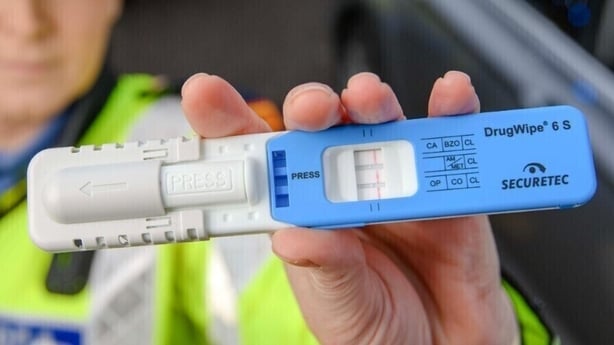Drug and alcohol testing on drivers will be carried out at Garda checkpoints around the country from 7 am on Thursday morning.
It is part of An Garda Síochana's Bank Holiday Road Safety plan and comes one day ahead of mandatory drug testing for drivers involved in serious crashes and collisions.
From tomorrow morning until Tuesday morning, there will be Mandatory Intoxicant Testing Checkpoints where gardaí will check drivers for the presence of alcohol or drugs.
It comes as a new provision in the Road Traffic Act that will make drug testing mandatory for any driver involved in a serious collision or crash comes into effect on Friday.
Minister of State at the Department of Transport Jack Chambers described drug driving as "reckless" and said this is a key reform in the Road Traffic Act, 2024.
He said there is a "very worrying trend of people consuming drugs and getting behind the wheel of a vehicle".
Minister Chambers said this new provision will send "a very clear message to those people that if they are in any collision or crash they will face mandatory drug testing".
At present, people involved in such incidents are only subject to mandatory alcohol testing.
In the past, gardaí had discretionary power to test for drugs.
This new provision also allows gardaí to detain a person for 30 minutes while they wait for the result of the drug test; as there was a gap in previous legislation when a suspect could leave the scene before the result.
We need your consent to load this rte-player contentWe use rte-player to manage extra content that can set cookies on your device and collect data about your activity. Please review their details and accept them to load the content.Manage Preferences
Assistant Commissioner Paula Hilman, Roads Policing and Community Engagement, said there have been increased detections in drug driving.
Last year around 8,000 people in total were found to be intoxicated while driving; 5,000 of them had alcohol and 3,000 were found to have drugs in their system.
An additional 10,000 Drugwipe testing kits were purchased earlier this year to facilitate these new rules.
It can take just 8 minutes for a positive result - the kits can test for five different drugs; cocaine, cannabis, opiates, benzodiazepine and methamphetamines.
Follow-on blood tests
In April, a Policing Authority report looking at 2023 found concerns raised from some members of An Garda Síochána who, following a roadside test for alcohol and/or drugs and arrest, they must have a doctor carry out a blood test.
This is to confirm the presence of drugs or alcohol and is required in order to press charges.
However, the Policing Authority found there is a "widespread challenge in accessing doctors in a timely manner" and therefore, suspects are released without charge after a number of hours without a test.
Minister Chambers said this was a concern; "we need to work with An Garda Síochana and also the Department of Health and the HSE in order to make sure that the clear intervention made by doctors in following through on drug and alcohol tests that people face the consequences of their reckless behaviour is insured".
He said: "Work is ongoing to address the concerns raised by the Policing Authority."
That may include bringing nurses in to carry out blood tests - Assistant Commissioner Hilman said that is an option currently being discussed, so that there is someone qualified to take the blood sample at the Garda station.

Vigilance urged for motorcyclists
Ahead of the bank holiday weekend, the Road Safety Authority has warned this is the beginning of a high-risk period for motorcyclists.
Figures released by the RSA show out of the 79 fatalities on Irish roads so far in 2024, ten were motorcyclists, the same amount killed over this period last year.
Sam Waide, Chief Executive Officer of the Road Safety Authority has appealed to all road users to take care; he said motorists need to be more vigilant, particularly at junctions; "that second glance can save a life".
He said this weekend is the start of a very busy period for motorcyclists to be out on the road and the RSA figures show most fatalities and serious injuries take place in the month of June.
Mr Waide said there are two main factors in fatal accidents; overtaking and losing control of the motorcycle.
He said the RSA is appealing for motorcyclists to slow down and for all other road users to be aware of all vehicles around them.
There are many more motorcycles expected on Irish roads this weekend, with thousands of enthusiasts heading to BikeFest in Killarney.
Assistant Commissioner Paula Hilman said they wanted to get the message out to all road users to look out for one another, while for drivers the message is "think bike, check twice".
She said all motorcyclists should drive at the speed limit while also ensuring their bike is properly maintained and regularly serviced.
She said An Garda Síochana hope to get more places available on the Garda Bike Safe programme which was fully booked last year when all 320 places were taken up.
Ms Hilman said the classroom-based course is followed by observation on a ride by a Garda advanced motorcyclist who then gives the motorcyclist feedback.







